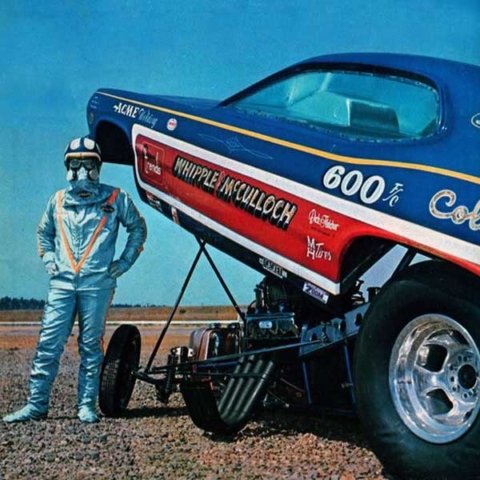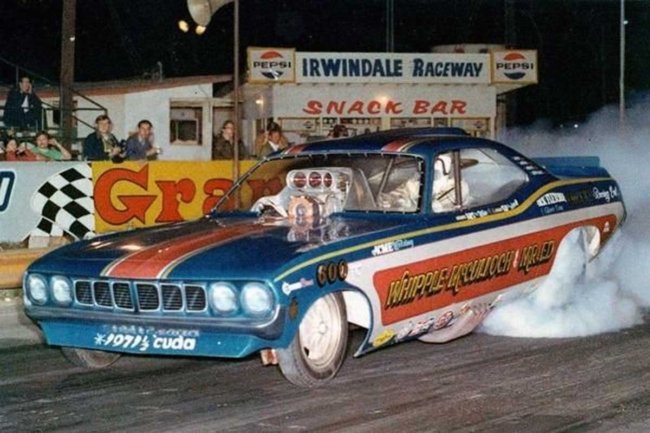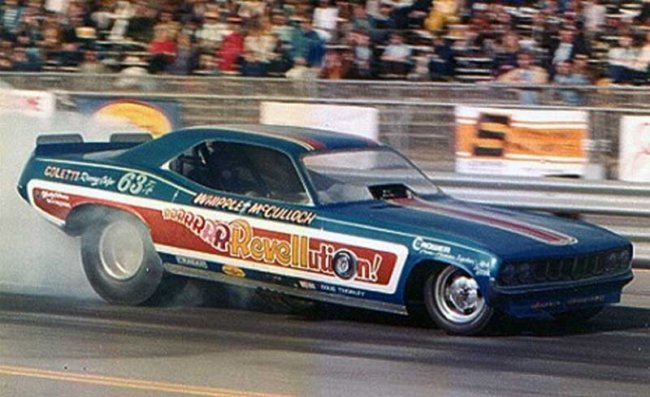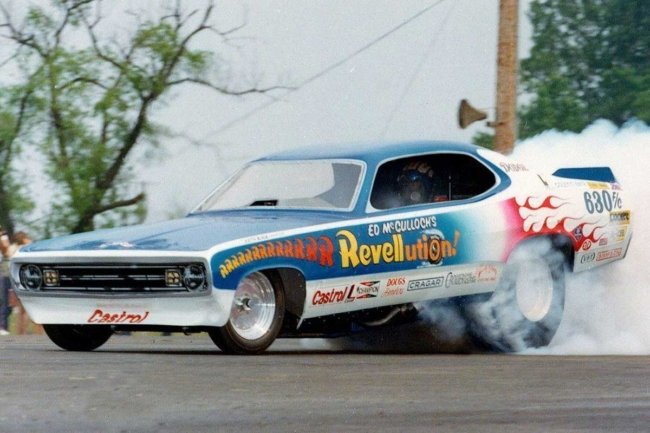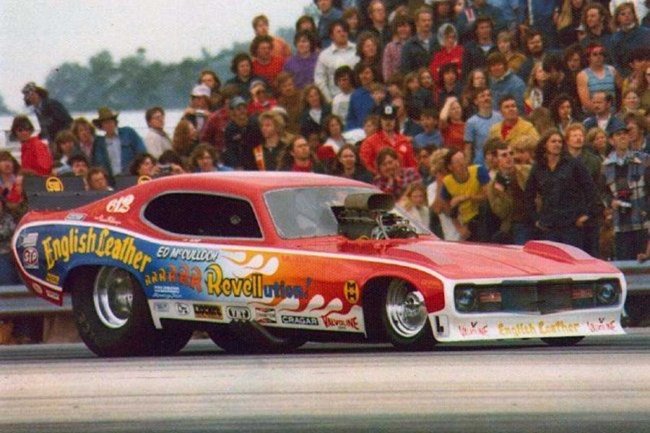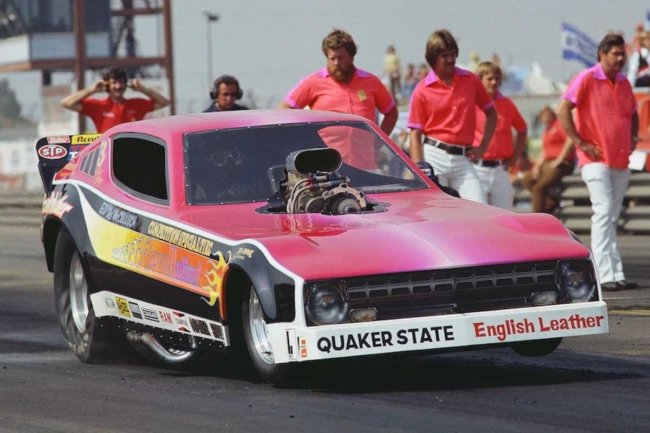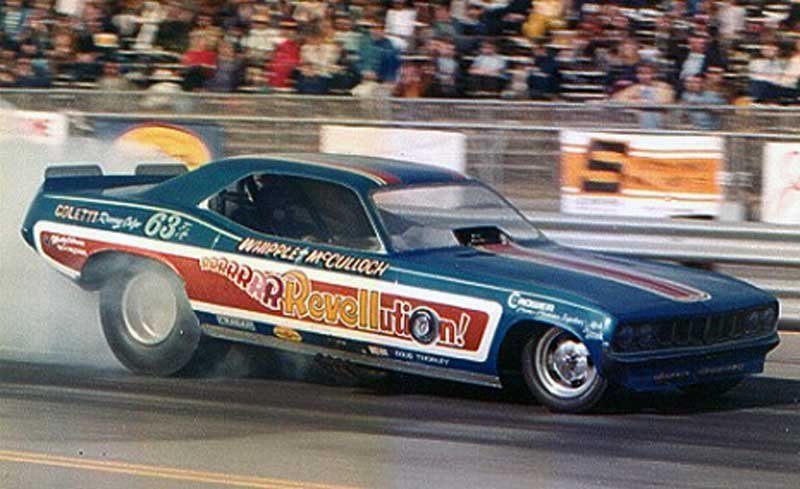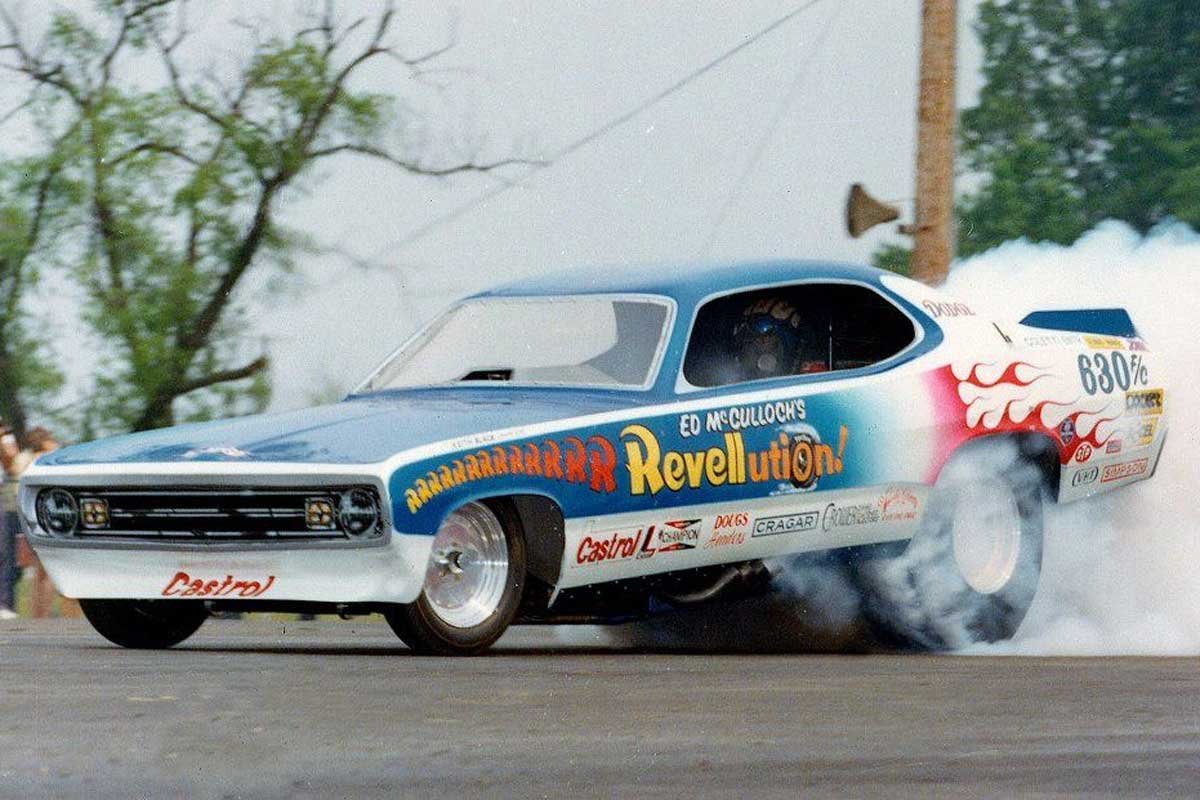
In the 1960s, ‘70s, and even the ‘80s, at the beginning of each racing season, the Labor Day weekend at the NHRA-sanctioned U.S. Nationals (aka “The Big Go”) was circled on the calendar as a must “be there” occasion. The Thursday – Monday event always had packed classes because racers, even if they did not race another event during the year, saved their best parts for the prestigious race held at Indianapolis Raceway Park in Brownsburg, Indiana.

Above: Ed “the Ace” McCulloch won his first NHRA national event at the 1971 U.S. Nationals. McCulloch, his brother Dan, Art Whipple, and “Mr. Ed” Wills had the Plymouth Cuda-bodied Funny Car dialed on kill for the entire event. While ’71 was his first U.S. Nationals championship, it was not his last. (Photographer Unknown)
While the U.S. Nationals traces its origins back to drag strips in the 1950s, it has been held in Indiana since 1961. It quickly became an event held in high reverence by the racers because of its size and purse. With RJ Reynolds’ involvement with NHRA in the mid-1970s, the event became even more important because valuable Winston points were earned and applied to a season-ending total to award a class championship.
If a driver did not win an NHRA World Championship title, earning a U.S. Nationals trophy was a career maker. Each NHRA event trophy is now known as a “Wally,” affectionately named after NHRA founder Wally Parks.

Above: The U.S. Nationals is the big one, and McCulloch, along with several other Mopar drivers, won or qualified #1 for the race. Champion Spark Plugs proudly proclaimed its dominance of the event with a full-page advertisement in the December 1971 Hot Rod magazine.
As shown in a Champion® Spark Plug advertisement in the December 1971 edition of Hot Rod magazine, the 1971 U.S. Nationals was a fantastic race for Champion and Mopar drivers. Except for Top Fuel Bike, for which Mopar did not have an engine, every other class was dominated by a Mopar, either winning its class or qualifying number one.
Top: McCulloch poses with his ’70 Plymouth. The Plymouth was destroyed in a towing accident fire just before the 1970 U.S. Nationals. (Photographer Unknown) Above: The team rebuilt after the accident but had to wait another year to get to Indy. For a brief time, “Mr. Ed” Wills’ name was included in the team’s name of Whipple & McCulloch, making it Whipple – McCulloch & “Mr. Ed.” (Photographer Unknown)
West Coast driver Ed McCulloch and partner Art Whipple (of Whipple Supercharger fame), along with help from McCulloch’s brother Dan and “Mr. Ed” Wills, won their first national event at The Big Go. McCulloch had been driving since 1964 when he and Dan built a front-engine dragster. Unfortunately, that dragster was damaged in a race-related accident, and for a short time, McCulloch contemplated stepping out of the driver’s seat permanently.
However, McCulloch partnered with Jim Albrich and returned to the cockpit in 1965. He immediately had great success, and by mid-June, he proved his skills by being named #1 on Drag News’ Mr. Eliminator list, a title he retained for the rest of 1965 and a portion of 1966 until “Sneaky Pete” Robinson would take over the #1 position.
Top: Whipple & McCulloch garnered sponsorship from the Revell model kit company after winning the U.S. Nationals. (Photographer Bob Plumer) Above: Defending champion McCulloch won the ’72 U.S. Nationals in his Revellution Dodge. In ’72, McCulloch did it independently as Whipple and Wills had left to field their Funny Car. (Photographer Unknown)
At about the same time McCulloch was wearing the Drag News’ #1 placard, he was tagged with the title “the Ace” by Seattle, Washington newspaper journalist Jim Cooper. The self-proclaimed “King of the Northwest”, Jerry “the King” Ruth, was a formidable Top Fuel competitor McCulloch had beaten a few times in ’65. So, after yet another McCulloch win, Cooper needing a headline, wrote, “What beats a king but an ace?” And it stuck.
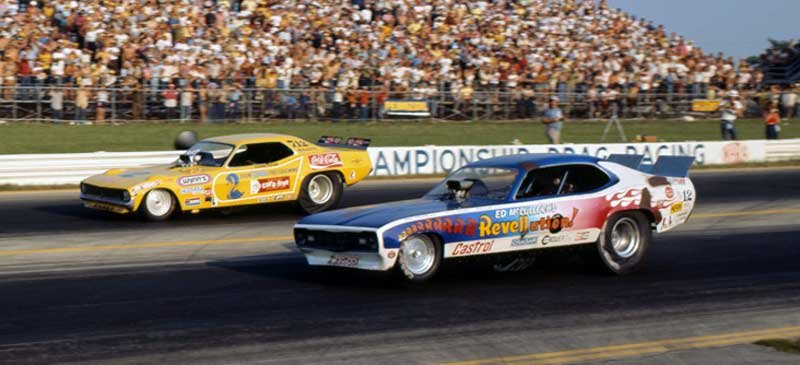
Above: McCulloch was on his way to a third U.S. Nationals title in 1973, but he carried the front tires down the track. With no steering, his Dodge drifted toward the centerline. After letting off for a moment and correcting his direction, McCulloch lost his momentum, and Don “the Snake” Prudhomme slithered by for the win. (Photographer Unknown)
By 1969, McCulloch had moved from Top Fuel to Funny Car, which was much easier to book match races at tracks throughout the USA. In 1970, McCulloch and crew had planned to attend the U.S. Nationals, but a trailer fire between Seattle and Portland two weeks before Indy ended the plans. Nevertheless, as described in the Champion advertisement, Whipple & McCulloch recovered and won the 1971 event.
Soon after the ’71 win, McCulloch garnered sponsorship from model kit maker Revell. Piloting a Dodge Demon-bodied Funny Car, McCulloch ran under the RRRRRRevellution name.
McCulloch sans Whipple would repeat as the ’72 Indy Nat’s champion. McCulloch continued to drive with decent success, but after the end of the Revell sponsorship in 1977, he had difficulty attracting new support. As a result, McCulloch sat out the 1979 and 1983 seasons and only raced part-time in 1982. However, in 1980, he did drive the Super Shops Plymouth Arrow, winning another U.S. Nationals “Wally.”
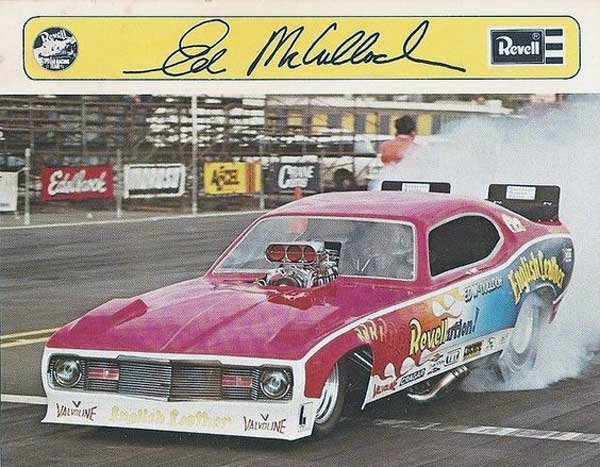
Above: McCulloch switched to a Dart Sport body in the mid-1970s. Revell continued its sponsorship, and McCulloch added English Leather sponsorship. The photo is a hero card given out at the track. (Photographer Unknown)
In addition to his first two Indy wins and the third in 1980, McCulloch netted two more Funny Car titles in ’88 and ’90. In 1992, McCulloch earned a 6th, this time in Top Fuel. After his driving career ended in 1993, McCulloch plied his talents as a Funny Car crew chief for Connie Kalitta, Don Prudhomme, and Don Schumacher team drivers.
McCulloch retired after the 2010 season, but in his four decades of racing, he had many highs with just a few lows. Because of his accomplishments, he has been inducted into the International Drag Racing Hall of Fame (2000), named #19 on the NHRA’s 50 Greatest Drivers list (2001), and inaugurated into the Motorsports Hall of Fame of America (2011).
Left: The Dart Sport body was used for more than one season. During the mid-1970s, McCulloch had good finishes, but wins were less than expected. (Photographer Unknown) Right: Like most Mopar racers, McCulloch moved to a Plymouth Arrow body. After the Revell contract ended, McCulloch had difficulty finding proper funding, so he sat out the 1979 and 1983 seasons. He ran limited events in 1982. (Photographer Unknown)
Since 1907, the Champion brand has been the undisputed world leader manufacturer of spark plugs for every kind of combustion engine including McCulloch’s nitro-burning Hemi. The Champion brand has been an integral part of product development for engines for the track, street, and even in the air.
Champion is a symbol of performance-driven quality. The company’s more than a century’s experience and commitment have led to design enhancements that optimize the performance of every spark plug it makes.

Above: McCulloch was a hired gun in the Super Shops 1980 Plymouth Arrow. McCulloch nabbed a third U.S. Nationals title in the Arrow. McCulloch would win two more U.S. Nationals Funny Car titles in non-Mopars and one more in a Top Fuel dragster. (Photographer Unknown)
While Champion continues to develop innovative spark plugs, it has expanded into vehicle and lawn mower batteries, filters, lighting, wipers, and braking components. The parts can be found at most quality automotive retailers. And if spark plugs are required, Mancini Racing has a line of Mopar-specific plugs to fit most Mopar engines. Labor Day will be here before you know it. So, screw in a set, and you will be ready for “The Big Go.


